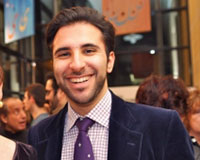Islamic revival movement may adapt to avoid Megamosque project collapse, claims scholar
by - 27th September 2012
 The Newham Megamosque is the focus of intense media scrutiny tonight, after 13 years of being largely ignored in UK, or written off as a hotbed of terrorism.
The Newham Megamosque is the focus of intense media scrutiny tonight, after 13 years of being largely ignored in UK, or written off as a hotbed of terrorism.
A full house of more than 100 journalists and supporters of hosts Lapido Media will attend the launch of the book Tablighi Jamaat at the Frontline Club, a media watering hole near Paddington Station.
The book, the first to be published by the charity in its new series of Handy Books for Journalists on Religion in World Affairs, is the work of a young academic who spent two years studying the reclusive Islamic group – the world’s biggest - on site near the Olympic village.
Dr Zacharias Pieri, a political sociologist shortly to take up a post at the University of South Florida, wanted to see how genuine were their attempts to engage with a planning process to build a mosque originally set to cater for 70,000 people.
He will say in his speech: ‘The norm for TJ is to remain aloof from politics in the hard sense of the word, as well as a preference for remaining apart from what they see as an immoral mainstream society.
‘In order to gain permission to construct their new mosque, TJ leaders have to prove that they and their movement are open, out-going, tolerant and engaged.’
He concludes that the research cannot predict how lasting or transformative the process will be – and challenges journalists to call the engagement process to account, instead of simply stereotyping or ignoring the growing movement.
Consolidating Islam
TJ, founded in 1926 in India, exists to consolidate Islam. It does so by visiting Muslim families (preaching tours), strengthening their way of life according to the six points of the founder, and insisting on distinctive Islamic dress and manners.
They also attempt to avoid westerners and shun western ways.
Says Pieri, who undertook his research under Dr Jonathan Githens-Mazer at Exeter University writes of the welcome he received during his two years of research.
‘TJ leaders in London were caught between having to teach its members to eschew interaction with secular society, while they themselves tried to adapt to the practicalities of negotiating with the world as a means to promote their project.’
The first formal plans for the mosque within a mixed-use development were lodged two weeks ago with Newham Borough Council following a torturous 13-year process involving illegal occupancy on contaminated land, temporary conditional permissions, followed by enforcement action when the conditions were not met.
The book details how the project took on a new dynamism when an elite team of planning consultants and lawyers was contracted with money raised by a millionaire property developer.
London is a crucial location for the TJ, who have had a presence in Britain since the 1940s. Says Pieri: ‘London is seen as a strategic location, a bridgehead to promoting the movement throughout Europe and the West. It is precisely for this reason that the Newham mosque is so important to the movement.’
The book sets the format for the new series, and contains timelines, pull-out quotes, biographies and background material to improve the media coverage of what Dr Jenny Taylor, a journalist and founder of Lapido Media, will say tonight is the ‘invisibilised religious dimension of so many running stories.
‘We will be publishing handbooks that scratch the itch, and feed the existing news agenda with facts, not our own opinions.
‘We have to ask ourselves increasingly as journalists: What are we not seeing? How does the invisible impact the visible – and why? What is being taught that makes people act as they do? What are the actual roots and sources of this?
‘Unless we do this, our stories will increasingly lose traction with the reality around us.’
- Log in to post comments
